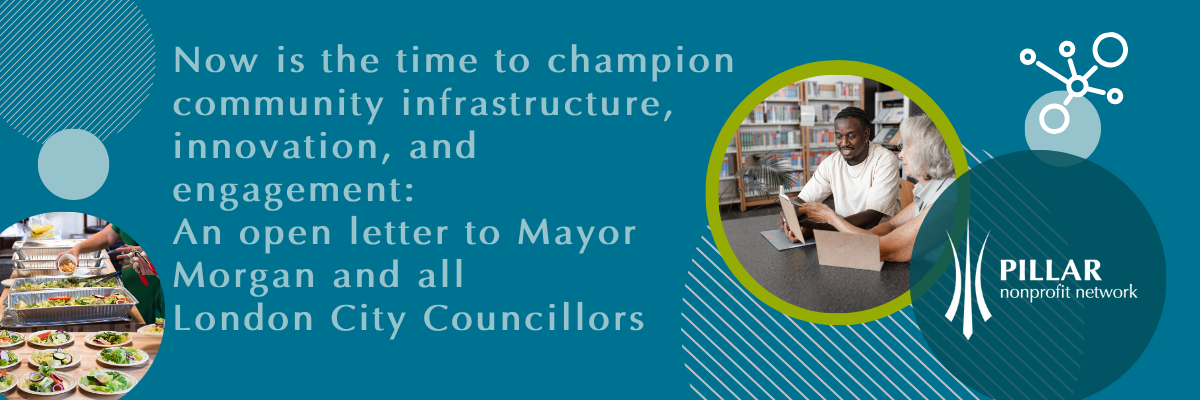
Now is the time to champion community infrastructure, innovation, and engagement: an open letter to Mayor Morgan and all London City Councillors
We were dismayed this week to learn that that Deputy Mayor Shawn Lewis and Ward 8 Councillor Steve Lehman plan to make a motion in the Strategic Opportunities Review Working Group next week, proposing to cancel funding for the City of London Capital and Innovation Grants and the Neighbourhood Decision Making program from 2025–2027. On behalf of Pillar Nonprofit Network, our network, and the nonprofit sector, I hope to convince you this is an ill-considered and dangerous idea that weakens our community and erodes the City’s credibility with London’s substantial and indispensable nonprofit community.
Right now, demand for nonprofit services is breaking records weekly; costs are rising for organizations and their communities; public policy choices are marginalizing more people daily; donations, generosity, volunteering and other forms of citizen engagement are declining; and social isolation is on the rise. Now is the time to champion community infrastructure, innovation, and engagement.
We understand you are all hoping to reduce the property tax impact of record expenditures in the City’s 2024-27 Multi-Year Budget. However, slashing the City’s investments in the community will cost London much more than it saves, and the idea rests on deep misconceptions about how community investment works.
It has been suggested that property taxes were never meant to be a mechanism to provide grants. Property taxes exist to fund essential services but, unless the City has capacity to bring all services in-house, grants to public benefit nonprofits are, in part, how the City delivers these services. Governments, including London’s, have long made nonprofits indispensable community liaisons, policy advisors, and program operators. A failure to invest in them will ultimately weaken the whole City.
Some have labeled nonprofit investments as “nice-to-haves.” On the contrary, Community Grants are one way the nonprofit sector works as an economic engine for the City, attracting investments London wouldn’t otherwise realize. Indeed, City policy demands agencies seeking Capital Grants “demonstrate they have applied to relevant federal and provincial government funding streams that align with the capital project deliverables.” Take, for example, the elevator at Innovation Works, Pillar’s coworking, meeting, and events space. Pillar received:
-
$45,000 from a City of London Capital Grant;
-
$100,000 from the federal government’s Enabling Accessibility Fund;
-
$25,000 from a corporate donor;
-
$15,000 from an individual donor;
-
$10,000 from a foundation; and, to complete the project, we contributed
-
$95,000 from our own reserves.
The City’s $45,000 investment enabled a nearly $300,000 investment in community infrastructure, ensuring that one of the community’s most affordable working/meeting/event spaces is also one of the most accessible. This is need-to-have in a competitive economic environment.
A cohesive community is more than “nice-to-have.” Academics, pollsters, and health care workers are sounding alarms about social isolation, burnout, and compassion fatigue. As a cause and an effect, volunteering and giving are down and loneliness has become a serious risk to personal health and public health. Voter participation is also declining rapidly, and we’re experiencing a significant reduction in civic participation. We agree the Neighbourhood Decision Making program can be improved, but this could happen incrementally, year-to-year, as happened with the 2024 program. Now is not the time to withdraw a program for participatory budgeting that gets folks engaged and whose popularity is on the rise. Citizen engagement is not a nice-to-have; it’s what’s holding us together.
Similarly, in a world of wildly accelerating change and complexity, innovation is another need-to-have, which fact is embedded in the City’s 2023-27 Strategic Plan vision statement. The nonprofit sector is no small thing in Canada, contributing 8.4% of GDP and employing 2.6 million workers, larger than mining, transportation, or oil and gas. Would we consider innovation in any of these sectors a “nice-to-have?” Would we choose not to invest public monies in those sectors?
Finally, the ongoing minimization of the unparalleled impact of the nonprofit sector, when you consider output vs. investment, is exhausting. As word spread of this motion, every nonprofit leader in the City had to put aside their critical work to address this crisis. I will have more to say about all of this as a delegate to the first Meeting of the Strategic Opportunities Review Working Group. I welcome your questions in the meantime.
Respectfully,
c/o Innovation Works, 201 King Street (2nd Floor), London, ON N6A 1C9
519-433-7876, ext 201
